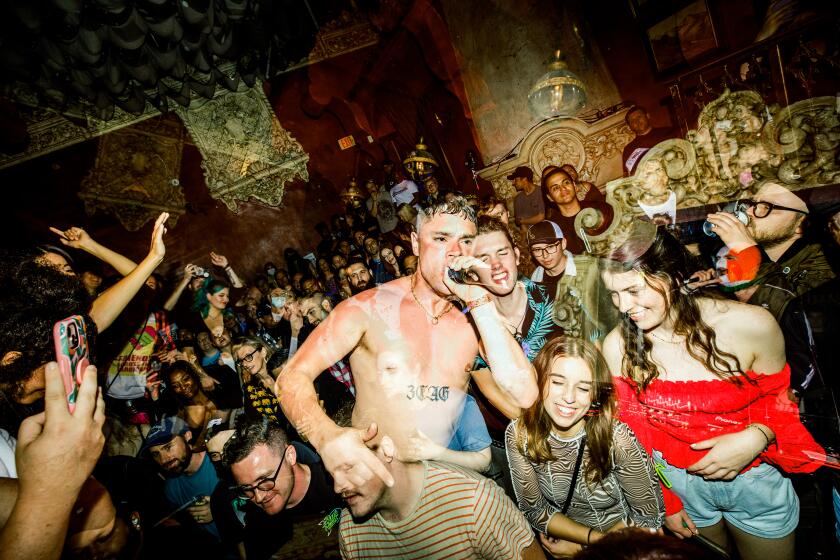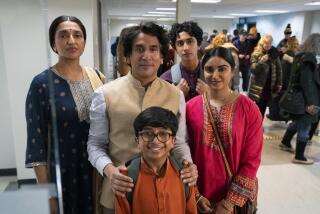Making a ‘biopic in real time’ with the Irish-language rappers of ‘Kneecap’
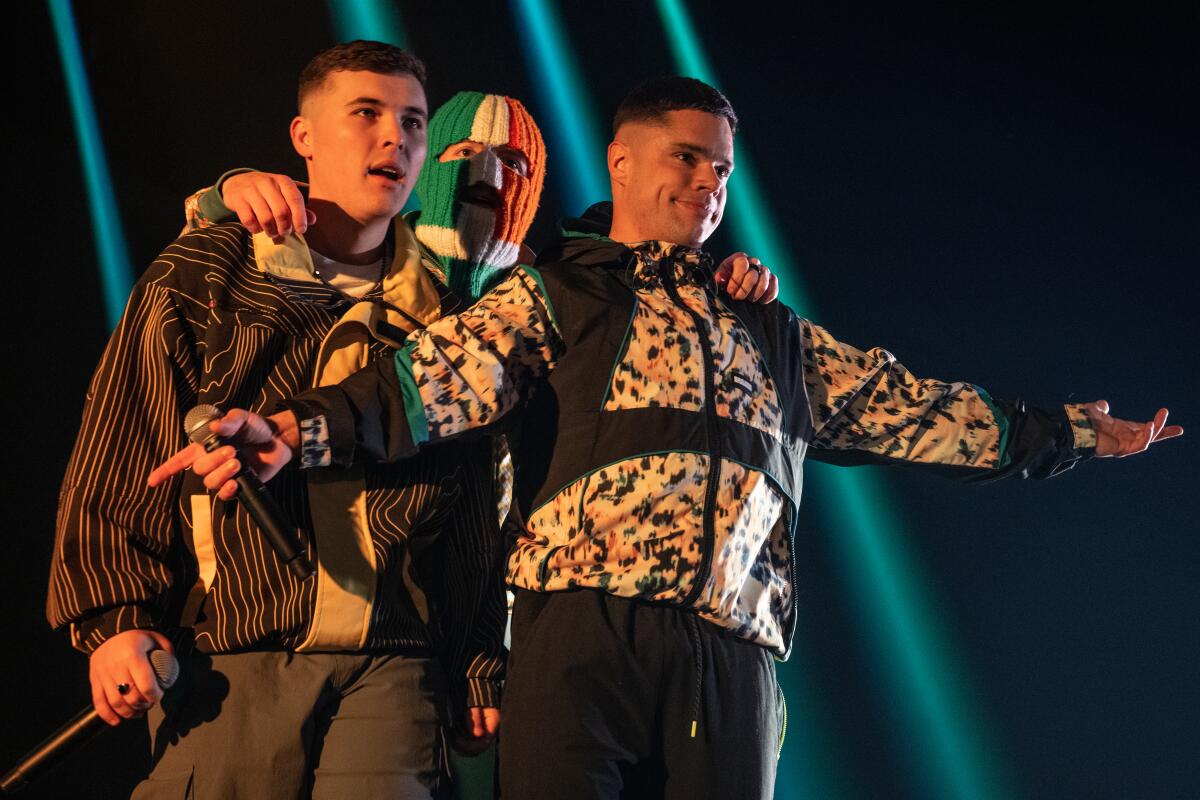
- Share via
When filmmaker Rich Peppiatt first began working with the three members of the Belfast hip-hop group known as Kneecap on creating a movie around their groundbreaking story as Irish-language rappers, he playfully created a WhatsApp messaging group called “Kneecap Go to Hollywood.”
“These were things that we were sitting in the pub in 2019 talking about over pints,” says Peppiatt. “It all felt quite pie-in-the-sky.”
And so it is rather remarkable that, a little over four years later, Peppiatt finds himself in a hotel room just off the Sunset Strip with band members Móglaí Bap and DJ Próvaí to talk about their collaboration on the film “Kneecap.” (Member Mo Chara was unable to make the trip to Los Angeles.) A raucous tale that mythologizes the energy and sensibility of the trio in the tradition of “A Hard Day’s Night,” “Purple Rain,” “Spice World” and “8 Mile,” “Kneecap” won an audience award when it premiered earlier this year at the Sundance Film Festival.
“Obviously it was the ambition,” says the director, “but we could never really dream that it was going to go this well.”
English remains the dominant language in Ireland, and the movie finds the rappers running afoul of radio programmers, local political groups and authority figures of any kind in part through their use of Irish, as well as the content of their lyrics, which blend anticolonialist politics with hedonistic exhortations of drug use and partying.
“A lot of the big turning points in the movie are based on truth,” Móglaí Bap says of the movie’s evocation of their rise.
“It’s some of the more mundane things in the film that are the untrue stuff,” adds Peppiatt.
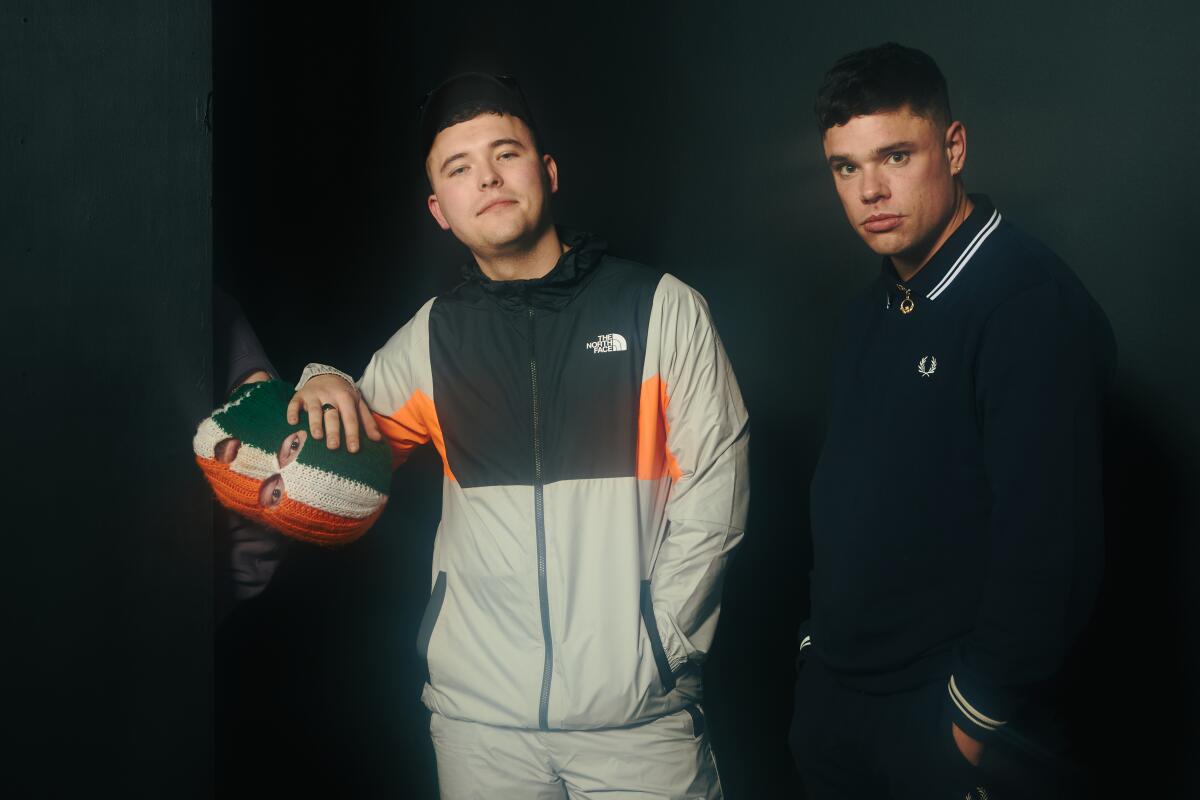
DJ Próvaí was indeed a schoolteacher when the group started in 2017, which is why he began wearing a face-covering balaclava onstage to hide his identity. (And, per the film, he did once drop his pants to display “Brits Out” written across his bottom.) However, Móglaí Bap’s father, played in the movie by Michael Fassbender, was not a fugitive from the law.
“These characters represent where we come from and the people we grew up with,” explains Móglaí Bap. “So it’s not only our story, but it’s everybody’s stories. Like, half of my class, their parents would’ve been ex-IRA members. So it’s not necessarily always our personal story, but it is the collective story of Belfast.”
Controversial Irish emcees Móglaí Bap and Mo Chara and DJ Próvaí came to L.A. for the first time with something to prove — and let the fiery rhymes in their native tongue do all the talking.
The group did not set out to become lightning rods of a movement to revive the use of the Irish language, which their headline-grabbing antics and instinctive flair have inadvertently turned them into. At first the band simply wanted to talk in the way they spoke to one another, among friends.
“Obviously when you speak a language that not many people speak, it is a sense of pride and a sense of honor that you speak this language, and you want to represent that language,” says Móglaí Bap. “But initially when we started off, we just wanted to do it for fun. We had no intention that anyone outside of Belfast would even listen to the music. We didn’t have any intention of creating a band even, because obviously there hasn’t really been something like that before.”
“Kneecap” makes the specific point that language does make a difference. There‘s a strong distinction between saying “Northern Ireland,” the country’s official name as part of the United Kingdom, versus “the north of Ireland” for those who believe in a unified Ireland in opposition to colonial power.
“I felt it was so inspiring and so political, the idea of rejecting even the language of the country that you lived in,” says Peppiatt of his inital interest in the band for his narrative feature debut. “To say, ‘You know what? I don’t only not recognize this country that I live in, but I’m going to reject the very language.’ It was just a really powerful statement about what your beliefs are.”
Yet Kneecap’s political vision doesn’t stop at the borders of Ireland. The group has long been outspoken in its support of Palestinians. Cast members from the film attended a pro-Palestinian rally in Park City, Utah, while at Sundance.
“We don’t see it as a massive political act to talk about what’s happening in Palestine,” says Móglaí Bap. “It’s just seen as people standing up for human rights, for people being bombed from the sky. And that’s what’s happening in Palestine. There are war crimes being committed. And I think when there are war crimes being committed, you should speak up against it.”
“What you need to understand as well is there’s always been a connection between the people of Ireland and the people of Palestine,” adds Peppiatt. “That sense of being under the thumb of a colonial power is something that has followed the Irish people for 800 years. I know it’s a very hot topic in America and it can be seen as being controversial to show support, but in Ireland it’s the flip. To be pro-Palestine in this situation is the default setting.”
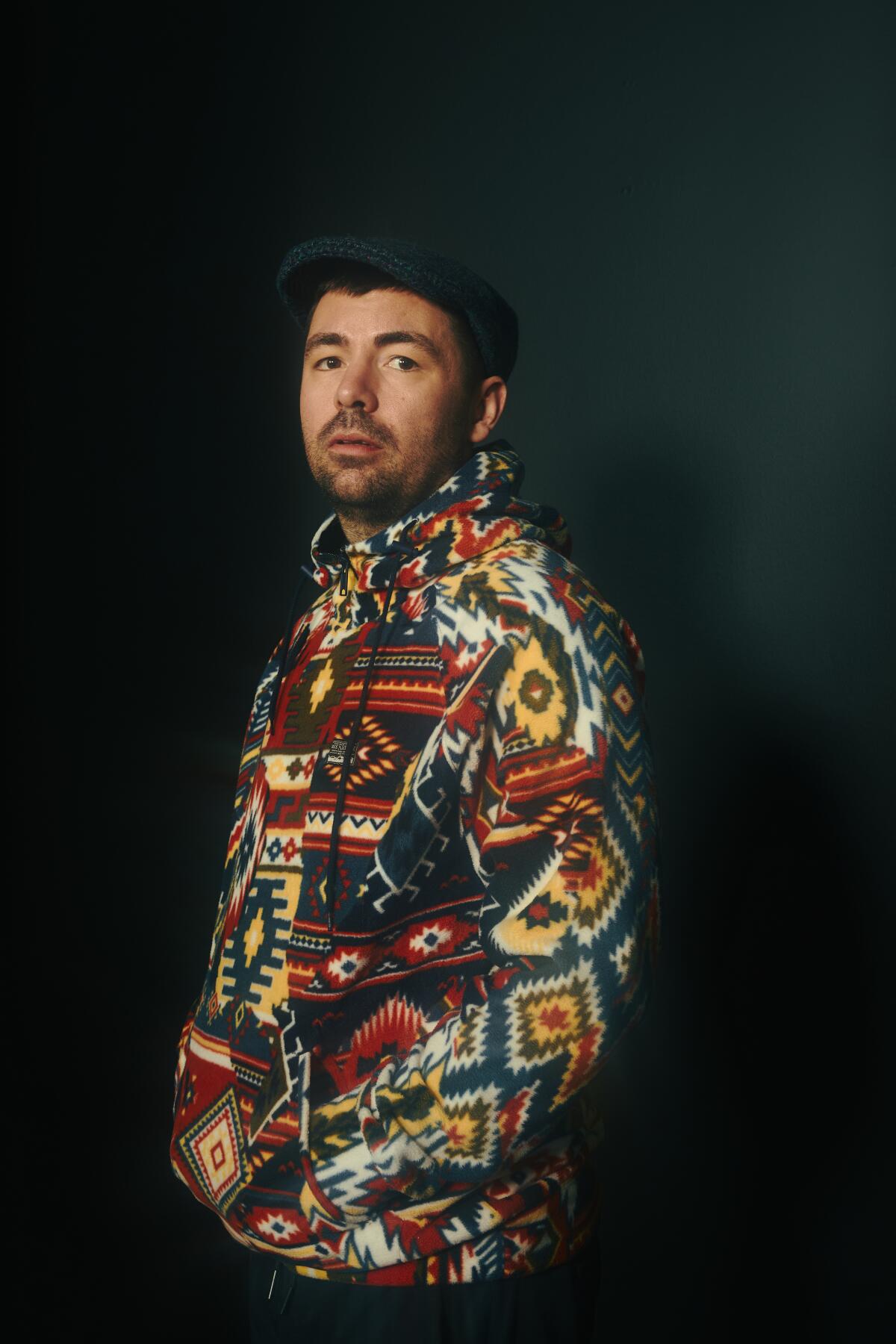
Peppiatt is a former tabloid journalist — his 2011 resignation letter became a story unto itself — who made a 2014 satirical documentary, “One Rogue Reporter,” specifically about his decision to leave the industry amid the phone hacking and ethics scandals that were then rocking British media.
Having transitioned to writing and directing for television, Peppiatt was immediately struck by Kneecap’s energy when he first encountered them. Yet he remembers how fantastical the very idea of a movie about them was when he initially approached the band.
“The idea of making a movie that was about a local Irish band who weren’t signed, never released an album and were rapping in a language that not that many people spoke, doesn’t scream to you ‘hit movie’ territory,” Peppiatt says. “It felt so niche and illogical to make a film about that. But that is the very reason to make this film.
With “Kneecap,” he’s made a different kind of music movie, one that unfolds as it happens. “The idea of kind of doing a biopic in real time, [about] a band who are almost tracking what they’re doing as they’re doing it, was itself just a cool concept,” he says.
Kneecap’s members were, at first, understandably wary of the motives of this Englishman approaching them to tell their story.
“The English have a bad track record of trying to profit off the backs of Irish people,” says DJ Próvaí.
After six months of Peppiatt pursuing the band, they finally began to talk to him and eventually agreed to the idea. (The film’s screenplay is credited to Peppiatt, with a story nod to the members of the band.) Eventually Peppiatt even convinced them to take acting lessons before shooting began.
“Once the film was done, everybody who was working on the film would move on to the next film and we’d still be Kneecap,” says Móglaí Bap of their commitment to the project. “For us as a band who are Kneecap, if the movie’s s— and we are s— and Rich is s—, then our music careers, I’d imagine, would be over.”
“I mean the challenges Rich had as well, trying to give us directions,” says DJ Próvaí. “We’re playing ourselves, so we knew exactly what we would do. So that’s what honed it to make sure it was real and genuine and authentic as well. But fair play to Rich, he took it on the chin.”
With their mix of good-times irreverence and liberationist politics — partying for their rights — Kneecap captures the attitude of people who want to be taken seriously without having to behave entirely seriously all of the time. Peppiatt notes that when he first went to a night class to learn to speak Irish as he was embarking on the project, a handful of other people were there because they were fans of Kneecap. As the band’s profile has grown, those classes have only gotten more crowded.
Móglaí Bap sees that as a shared impulse to escape the prescribed boundaries of native culture. “We’ve broken out of that,” he says. “And I think that’s what really gets on people’s nerves, that we’re using the language in a modern way. And I think it’s happening all around the world. With Indigenous cultures, they say, ‘We’ll let you have your culture, but you have to express it in a certain manner.’ We use the language in a way that doesn’t suit their perception.”
More to Read
Only good movies
Get the Indie Focus newsletter, Mark Olsen's weekly guide to the world of cinema.
You may occasionally receive promotional content from the Los Angeles Times.
